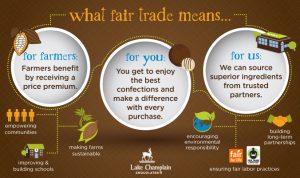
As the parent of a small child, there is never a shortage of chocolate in my house, between Halloween, Christmas, Valentines, Easter and Birthdays. When I’m at work, chocolate always seems to find a way into the office to satisfy someone’s sweet tooth. Chocolate is all around me, and it wasn’t until our contemplative practice about chocolate, that I really begin to see my easy access to chocolate as a privilege.
Each week the contemplative practices are the one assignment that I find myself looking forward to. These meditative moments not only help me detach from daily stresses, but they also help me connect to the material on a deeper level. As we were transported into the world of the cocoa farmer, I was surprised to learn of the child labor involved. I couldn’t help but picture my own child in that situation and what a difficult decision it must be to feel that you have no other choice but to make your child work to help with the family income and forgo a good portion of their education. Not only does this force them to grow up quickly, but harvesting cocoa is also incredibly dangerous. This made me reflect on the amount of chocolate my child has, which was likely harvested by children with less privileged lives.
I also didn’t realize that the cocoa farmers weren’t aware of the product they were harvesting. Watching them learn about chocolate and share it as they ate it for the first time was a joyful moment. It made me realize how much I take chocolate for granted. This also sparked thoughts of how much money these farmers are making compared to the cost of a chocolate bar, and the economic inequality involved in this process.
While I know I won’t be escaping from the grasp of chocolate industry anytime soon, I will make an effort to be a savvier consumer when purchasing chocolate; buying fair trade products to help ensure farmers make a sustainable wage in exchange for their labor.
